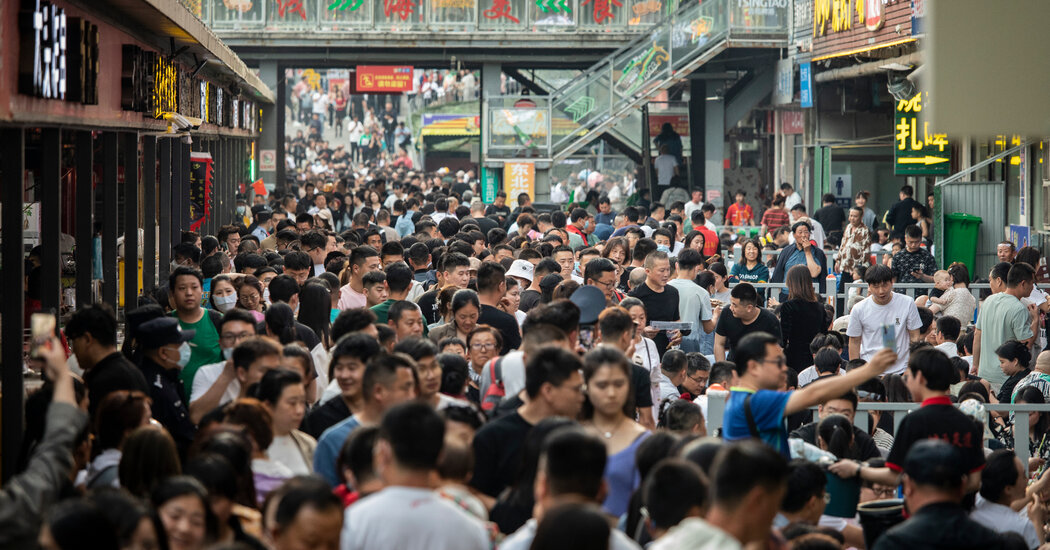Due to the massive impact of the shutdown of Shanghai, home to 25 million people, a comparison from this spring to last spring “gives a misleading picture of China’s economic performance,” said Diana Choyleva, chief economist at Enodo Economics in London.
Instead, analysts said, a more accurate measure of the economy emerges by comparing the second quarter of 2023 to the previous three months, after the “zero Covid” policy was dropped.
And according to that measure, production in the second quarter was only 0.8 percent higher than in the first quarter. Projected for a full year, that’s a growth rate of just over 3 percent per year, compared to about 9 percent in the first quarter.
The Chinese economy is showing many warning signs.
Exports plummeted in June in particular. Weak spending is pushing China close to a dangerous trend known as deflation: consumer prices are flat and wholesale prices paid by businesses are actually falling.
House prices have been falling in smaller cities and that fall spread to the big cities in June. It was another blow to the country’s real estate development and construction sectors, which make up at least a quarter of the economy and have already been rocked by dozens of defaults on bonds issued outside China.
Data released by the National Bureau of Statistics on Saturday showed that the 70-city index of home prices fell 2.2 percent year-on-year in June, after eroding just 0.2 percent year-on-year in May.
Investment has stumbled, with foreign companies in particular showing little interest in putting more money into China. Local governments are tight on cash. Baoding, a city of 12 million in north-central China, had to suspend most bus services last week.
“It’s not a strong recovery; the economy is quite weak,” said Wang Dan, chief economist at Hang Seng Bank China.
Signs of further economic problems persist. The National Bureau of Statistics said on Monday that industrial production — a measure of the output of China’s factories, mines and power plants — rose 4.4 percent last month, while retail sales rose 3.1 percent from the previous month. a year earlier. The General Administration of Customs announced last week that exports fell 12.4 percent in June from the same month last year, which was unusually strong.
Last year, after the Shanghai lockdown, retailers in the United States and Europe ordered three months’ worth of stock from Chinese factories to deal with delivery delays, said Richard Fattal, co-founder of Zencargo, a London-based logistics company. Companies are now ordering half that amount, temporarily putting pressure on Chinese exports.
Some companies are also moving supply chains out of China, which will have a longer-lasting effect on exports, Mr Fattal said.
Workers are also struggling. The incomes of millions of people in China were under severe pressure during the pandemic and remain weak. Unemployment among 16- to 24-year-olds, which was particularly acute over the past year, reached 21.3 percent in June, according to data released Monday, the highest level since China began announcing the statistic in 2018.
The economy has performed so badly in recent weeks that Lou Jiwei, a former finance minister, publicly suggested last week that the Chinese government should increase spending by between $208 and $277 billion this year to stimulate the economy.
There are still some hints of power to be found. Unemployment among 25 to 59-year-olds remained low at 4.1 percent. Auto sales rose 8.7 percent in June compared to the previous month, the sixth month of rising sales, said Cui Dongshu, the secretary general of the China Passenger Car Association.
Fu Linghui, a top official at the National Bureau of Statistics, said Monday that consumer prices are not a problem. “In general, there is no deflation in Chinese society and there will not be in the future,” he said.
Why it matters
China has a major influence on global growth. The government has conducted a self-reliance campaign in recent years to make more goods at home. Yet China remains the world’s largest importer of food, oil and many other commodities.
But there are many signs that Chinese families are reluctant to spend, including the falling prices of commodities like pork and the drastic erosion of the housing market, which has long been the primary means of building wealth.
Many economists say China’s future demand for goods and services will depend on Beijing’s policy decisions. Some, like Mr Lou, have called on the central government to launch a spending program to create jobs and boost consumer activity. But a massive buildup of debt, especially at the local government level, has made that difficult. Officials instead relied on monetary policy measures such as interest rate cuts, which were already cut last month and could be cut further.
“If there is no policy response, including monetary response, then I don’t expect much of a recovery,” Ms. Wang said.
Li you contributed research.

